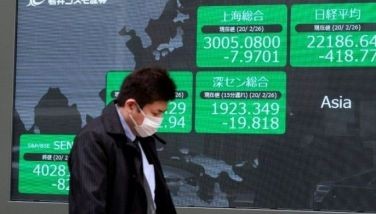Georgians hit by fallout from trouble in Russia, Ukraine
TBILISI — For Mariam Matiashvili, Georgia's crumbling tourist trade is a health risk.
The 64-year-old woman spends much of her meager pension of 150 lari ($68) a month on medicine and has long lived off selling cheap jewelry at a flea market to tourists, mainly from Russia and Ukraine. Now, the number of visitors is shrinking due to the economic crisis in those countries and people like her in this former Soviet republic are feeling the pain.
"There were some signs of life in January, when suddenly some tourists from Russia, Ukraine and Poland appeared, but since then it's been a complete catastrophe," said Matiashvili. Some days she makes five lari from tourists, sometimes only one.
Georgia, a mountainous nation in the South Caucasus, relies heavily on wine exports and on tourists attracted to the mountains and beaches that for decades made the country a favored holiday destination for the Soviet elites. While tourists might ordinarily be enticed as Georgia's currency sinks, making travel cheaper, many of those who visit Georgia come from countries facing their own economic problems.
Georgia's currency, the lari, has lost more than 20 percent of its value against the dollar since August — but Ukraine's hryvnia currency has lost about 60 percent against the dollar and the Russian ruble roughly 50 percent.
Due to the economic tensions, tens of thousands took part in an opposition-led protest yesterday in the capital, Tbilisi. The demonstration was peaceful, despite the bitter political divide between the government team formed by billionaire Bidzina Ivanishvili's Georgian Dream party and supporters of former President Mikhail Saakashvili, whose party has been in opposition since losing the 2012 election.
Those at the protest spoke bitterly of their dashed economic hopes.
"In the last elections, I voted for Georgian Dream; their promises were very pretty. But now it's become clear that they've fulfilled almost nothing," said demonstrator Tina Khomeriki, a 35-year-old teacher.
The government, led by Ivanishvili ally Irakli Garibashvili, insists the crisis has been talked up by political opponents and sensationalist media and is not the result of policy failings.
"I think that really an artificial hysteria has been created, especially by the media," Prime Minister Garibashvili said last month in a notably pugnacious response. "We have to calm, normalize and stabilize the situation. I want to say that we're doing everything to correct the situation as quickly as possible."
While it has been 24 years since Georgia voted for independence from the Soviet Union, the country retains close business links to Russia and Ukraine. As the war in eastern Ukraine, international sanctions against Russia and the sinking price of oil price worldwide have ravaged the economies of those two countries, Georgia has become collateral damage.
While the falling lari has made many imports more expensive, it has fallen by less than the Russian ruble over the last year, making exports to that key market more difficult. One affected industry is Georgian wine, long renowned in neighboring countries, and which has started to attract the attention of European and American connoisseurs in recent years. Despite producers branching out, Russia and Ukraine remain the top two wine export markets. In January and February this year, exports to Russia were down 85 percent and those to Ukraine fell by two-thirds.
Paata Sheshelidze, director of the Institute of Economic Freedom, said the economic difficulties have been made worse by government policies, including regulations and taxes that he said have restricted development of the private sector. The weakening of Georgia's currency, he said, was largely due to an increase in the money supply to cover budget expenses.
The currency turbulence has also had a devastating effect on those Georgians who took out foreign-currency loans in search of lower interest rates. Igor Khuchua mortgaged his apartment to fund a bakery, but now, at 66, he faces being made homeless. Despite getting help from the bank to restructure his debt, Khuchua sees no way out.
"I've basically lost my apartment. I took out a loan on it to open my business, but the lari's fall has had a negative effect," he said. "I can't blame anyone. I took the risk myself, but the situation's objectively worsened with the fall of the national currency."
- Latest
- Trending




























